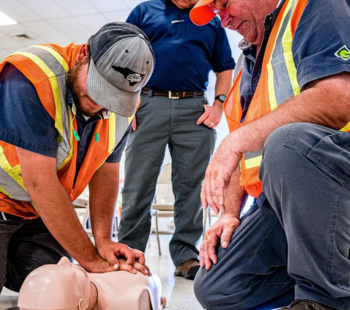The Importance of Health and Safety Competency
The Importance of Health and Safety Competency
September 2024
Health and safety competency is essential for businesses of all sizes, but it holds particular significance for small businesses in the UK. In smaller operations, where staff often take on multiple roles, the risk of safety oversights can be higher. Ensuring that all employees are competent in health and safety practices is critical, not only to protect their well-being but also to safeguard the business from potential legal and financial liabilities under UK law.
Competency: More Than Just Formal Training
Health and safety competency, as defined by the Health and Safety Executive (HSE), extends beyond simply attending formal training courses. It encompasses a combination of skills, knowledge, attitude, and experience.
- Skills: Workers must have the practical ability to carry out their tasks safely, which includes operating machinery, handling hazardous materials, and using protective equipment correctly.
- Knowledge: Employees should be familiar with the specific health and safety risks associated with their roles. This includes understanding company safety policies, emergency procedures, and relevant regulations such as the Health and Safety at Work Act 1974.
- Attitude: A proactive attitude towards health and safety is crucial. Workers who approach safety with diligence, adhere to procedures, and contribute to a positive safety culture help create a safer workplace.
- Training: Everyone needs formal training and a record kept to ensure that everyone has received the most up date approach to carrying out tasks and working safely. The e-learning courses found here on the Harwood Portal provide the foundational training for several health and safety topics. The portal will also keep a record of training for your whole team so no-one
- Experience: Practical experience plays a significant role in developing competence. Employees who have encountered different work situations are often better equipped to anticipate and handle potential hazards.
Competency involves continuous learning and adaptation. While formal training is important, it should be complemented by on-the-job experience and ongoing reinforcement from both employers and employees.
Employee Responsibilities
While employers have a duty to provide appropriate training, employees also have responsibilities under UK law. The Health and Safety at Work Act stipulates that employees must take reasonable care of their own health and safety, as well as that of others who may be affected by their actions. They are required to follow safety procedures, use equipment as instructed, and report any potential hazards or unsafe conditions to their employer.
Competency is not just about being trained; it is about applying that training in day-to-day tasks. If employees fail to follow safety protocols or neglect to use the protective measures provided, they not only endanger themselves but also the entire workforce.
In the event of an accident, the HSE or other investigative bodies will examine whether both the employer and employee have fulfilled their legal responsibilities. Investigators will look for evidence of adequate training, supervision, and whether employees followed the procedures outlined. If an employee ignored safety rules or the employer failed to provide proper training, both could face significant consequences, including fines or legal action.
Conclusion
Health and safety competency is a legal requirement under UK law and an essential component of any small business’s success. Competency encompasses skills, knowledge, attitude, and experience, and requires both employers and employees to play an active role in maintaining a safe workplace. Employers must ensure that staff are adequately trained and regularly assessed, while employees must apply their training diligently and follow safety procedures.
By prioritising competency, small businesses can not only reduce the likelihood of accidents but also ensure they remain compliant and protect both their staff and their future success.

